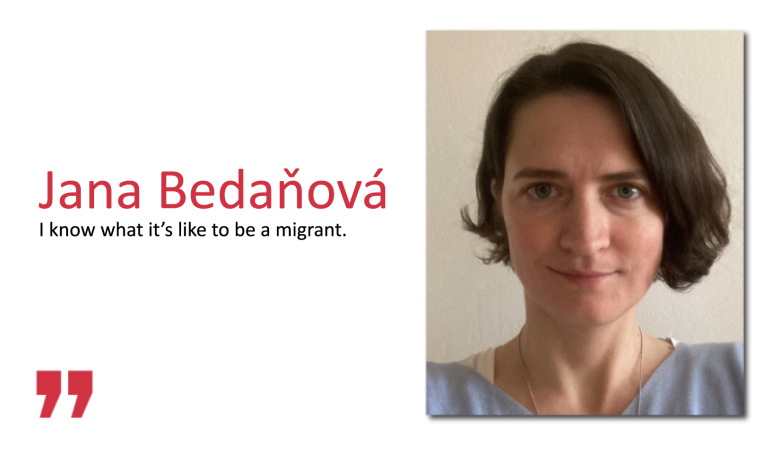Jana Bedaňová: “I know what it’s like to be a migrant”

Jana Bedaňová: “I know what it’s like to be a migrant”
We interviewed Mgr. Jana Bedaňová at the time when she received the Prof. JUDr. Karel Engliš Award for outstanding graduates in social sciences. It was awarded to her for her excellent academic performance and active involvement in a number of extra-curricular activities, especially within human rights NGOs. Her story is colourful, unconventional, and above all inspiring. She began studying law at the age of thirty-three, having previously studied other fields both in Czechia and abroad, where she also worked several years for Apple and Google. Currently, she works as a legal counsel for foreigners in the Association for Integration and Migration.
You received the Prof. JUDr. Karel Engliš Award for outstanding graduates. You’ve been performing above standard throughout your studies and your results were truly excellent. You majored in human rights and migration law, during your studies you went abroad to observe elections and you also worked as a volunteer for People in Need in Moldova. After the outbreak of war in Ukraine, you coordinated volunteers. What is the source of this desire to help others?
My story has several layers, so I guess I’ll start a little broadly. I’m not exactly the standard prototype of a student, because I didn’t start law school until I was thirty-three. I originally graduated from other schools. Right after finishing my last degree, during the economic crisis, I got lucky and got a job in Finland as a localization tester. I did well in this field, working for a while for Apple in Ireland and then also in the Google’s office in Prague. Around the age of thirty-three, I got to a point in my professional life where I was looking around for what to do next. I was aware of the fact that I was very lucky, I was in good health and had a good income for that time, but I also didn’t see much point in what I was doing anymore. I was looking for some activity with some kind of impact.
I would occasionally help out friends at non-profit organizations and some of them worked with people who found themselves in various difficult situations. In Czech society there was and, in fact, there still is a prevailing if-only-you-try-hard-enough narrative. In other words, if you are not doing so well, you probably haven’t tried hard enough and it’s your own fault. But in my experience, I don’t see it that way. Our success is largely determined by our family background and our surroundings, how supportive and encouraging our family or friends are. Compared to people who weren’t so lucky, I was born into a fairly materially secure family and I didn’t have to constantly secure my full income until I was almost twenty-five. Some of my achievements have often come about through serendipity - kind of being in the right place at the right time. And since society enabled me to achieve that success, including via free education, I felt it was only fair to give something back to society. From my friends’ work, it was clear what which jobs were most in demand when helping people: social workers, psychologists and lawyers. At some point I told myself: Law, why not, I can imagine doing that. And I submitted an application to law school.
So this is really an extraordinary story. You mentioned studying several degrees. What majors did you study?
In the Czech Republic, I obtained a bachelor's degree in International Area Studies. During my postgraduate years, I went on Erasmus to Ireland, where I ended up doing a local MA in Comparative Literature and Cultural Studies. I enjoyed literature and cultural theory, as I had also done a year of English studies in the Czech Republic before Erasmus. But after my MA as I was still living in Ireland and literally all Irish people had better English than me, I didn’t have much of an advantage in the local job market. So while working as a waitress and occasionally translating, I also pursued a graduate diploma in Localization Technology. It sounds cryptic, but the degree basically aimed to train linguists and translators to be able to test operating systems and software programs for language accuracy and to be able to verify the functionality of programs in a given locale. This is the field I had worked in before I decided to go to law school.
When you decided to study law, did you already have the intention to specialize in refugee or did you become interested in this field during your studies at the Faculty of Law of the Charles University?
No, I did not have such a focus from the beginning. I wanted to study law and find out on the go what it could be useful for. But it is true that the specialization in migration and alien law emerged quite naturally when picking the subjects at the faculty. After all, I lived in Ireland and Finland for years as a “migrant” myself and I know what it is like when you do not understand the local system or language well. Moreover, at the faculty I met Dr. Věra Honusková, who has been building an asylum clinic at the faculty for years. Asylum clinic provides subjects which form a specialization module. In this module, you can obtain credits for courses in asylum and migration law, for internships in organizations helping refugees and foreigners. There is also an internship at the Ministry of Interior, opportunities for internships in law firms working in this field and a simulation of a refugee camp in Vyškov. I could say that Dr. Honusková has been my mentor since my second year, when we met in her seminar on international law. The asylum clinic she helped build is a unique program within which she strives to give regular feedback to students and work with them as individually as possible. This is quite time consuming and I think this work is not always appreciated enough. A highlight of her efforts is the recent establishment of the Faculty’s Centre for Migration and Refugee Law.
So, your specialization occurred pretty naturally, however, your academic record shows that you’ve excelled in all subjects. Was that also purely out of interest?
I was lucky enough to enjoy more or less all subjects, although I gravitated towards migration and international law. Nevertheless, I don’t think law students need to be profiled during their studies. Lawyers need to have a general overview of all branches of law, hence the concept of law studies where all students study 80% of the same subjects in a common core. For example, if a student later applies for a trainee solicitor position in a law firm, they have to know potentially a little bit of everything, and as a lawyer even more so because you don’t know what kind of agenda the client is going to bring up. So I didn’t skimp on studying, but I did also enjoy it intellectually. On the other hand, I definitely see the opportunity to specialize at Law Faculty of the Charles University as a pleasant bonus.
The fact that you were a good student shows by your excellent grades you got during your studies. Your average was 1.13. You won the Praemium Excellentiae award for your thesis. How did you manage to study like this alongside your other activities and work?
I changed my job which helped a lot. I voluntarily left my position of a senior lead linguist and downgraded to the role of a common member of the team. I didn’t have to go to the office and I got the flexibility to work from anywhere, including the lecture hall (laughs). In practice, however, the way it worked was that when I had free time between lectures, I would sit in the school building and did proofreading. I admire people who manage their studies with children or with a traditional job. For me, that flexible work allowed me to get a law degree. And I can say without exaggeration that when I wasn’t working, interning or observing elections, I was studying pretty much all the rest of the time. Maybe it had something to do with my age. The older one gets, the more embarrassing it is to show up at an oral exam unprepared. At the same time, the constant time pressure made it essential for me to pass every exam at the first try. So every time I went to the exam, I had to feel like I was ready by at least 80 percent. Actually, looking back at it, I was also quite nerdy (laughs).
Just after you graduated, the war in Ukraine started and you got involved in helping refugees. How did that go?
I had finished school and I was on holiday for the first time in three years. I went on a pilgrimage to Santiago and when I was on my third day there, Russia invaded Ukraine and the war started. I found the first flight back to Prague. It was obvious that because of the large Ukrainian community in the Czech Republic, many people fleeing the war would head here. The day I arrived, I went to assist the arriving refugees at the Prague Main Railway Station. Then I got a call from the legal department of the Organization for Aid to Refugees, where I had previously interned. They needed a substitute. The situation in the office was critical. Hundreds of desperate people were calling every day, getting the phone number at the Main Railway Station, and most of them were looking for accommodation. We were three people picking up the phones and it was impossible to process them. I approached Dr. Honusková, who provided me with a list of potential law student volunteers. I asked them if they would be willing to assist with answering the calls. We basically set up a hotline operated in shifts, where, at first, we always had to retrain each shift of students. After about two weeks, I had to hand over the coordination because I was selected and sent as an election observer with the OSCE to Serbia. When I returned, I started working for People in Need as a programme coordinator in Moldova. A country where, by the way, there are even more refugees per capita than in the Czech Republic.
Are you currently working in the area of refugee law? What are the options of a law graduate who wants to work within this sector?
Since March, I have been working at the Association for Integration and Migration (SIMI) and I have been providing legal advice to foreigners. Mostly we work in the area of alien law and labour law, partially also asylum law. Our clients are often Ukrainian citizens with temporary protection. As far as the non-profit sector in this legal field is concerned, there are not so many organizations with legal counselling focused on foreigners. In Prague, these are primarily SIMI, the Organizace pro pomoc uprchlíkům, Inbáze, Integrační centrum Praha and Poradna pro integraci. Asylum clinic graduates can of course also work in law firms. Many of the graduates provide legal advice to foreigners regarding the residence permits. Alien or migration law does not concern only refugees, there can be citizens of USA, UK or Latin American countries that seek legal advice here. It is also possible to work at administrative courts, the Ombudsman's Office or the Ministry of the Interior.
Thank you very much for the interview. I wish you can continue doing things that fulfill you and that you find meaningful.
Thank you.








